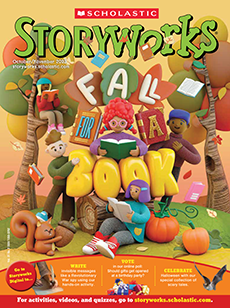Did "Mars Needs Guitars" pique your students' curiosity about the Red Planet? This NASA just-for-kids website is packed with information and activities that will turn them into Mars experts. They can even send a postcard to the Curiosity Rover. Address? Mars, of course!

Mars Needs Guitars
What does it take to make life happier?
Learning Objective: Students will discuss and identify the theme of the story: Small actions that make other people happy can have powerful effects.
What lies below the surface of Mars? On November 26, 2018, the NASA spacecraft Insight landed on Mars to explore that question. This webpage and accompanying video will let your students in on the mission.
More About the Story
Skills
Theme, setting, figurative language, character’s motivation, inference, plot, synthesizing, author’s purpose, supporting an opinion, narrative writing
Complexity Factors
Levels of Meaning/Purpose
"Mars Needs Guitars" tells the story of a child coping with an uncertain future as humans move to Mars when Earth becomes uninhabitable. Its theme proposes that in trying times, our lives become better by helping others. Readers will need to make several inferences to understand the story.
Structure
The story is chronological, taking place in an imaginary future.
Language
The story includes a few challenging words, such as ration and temperament. It has a lot of dialogue and a few similes.
Knowledge Demands
Familiarity with science-fiction will be helpful but is not required. The story refers to an imaginary TV sit-com, so familiarity with that genre will be helpful.
1. Preparing to Read
Set a Purpose for Reading (5 minutes)
- Have students look at the title and images on page 10. Discuss what kind (or genre) of story they think it might be. (Students might suggest that it will be science fiction because the title and background image reference Mars; others might think the playful lettering suggests a funny story.)
- Preview the questions in the margins. Point out the blank “Write your own question” bubble on page 13.
- Note: In “Mars Needs Guitars,” author Geoff Rodkey cleverly never specifies whether Lan is a boy or a girl, although students will probably not notice this as they read. After reading, ask them how they picture Lan, and why. This can lead to a discussion of how each reader might envision characters differently, depending on what the author says and their own experiences.
Vocabulary (10 minutes)
- Distribute our vocabulary activity to preview five words. Students will also be able to add other unfamiliar words from the story.
- Vocabulary words include shortage, compartment, underestimate, ration, and temperament.
2. Close Reading
First Read: Get to Know the Text (20 minutes)
- Have students read the story independently or listen to the audio version as they follow along in their magazines. You might assign it as homework.
Second Read: Unpack the Text (30 minutes)
- Read the story again as a class, pausing to discuss the close-reading questions in the margins. Answers follow.
- Discuss the critical-thinking questions.
Answers to Close-Reading Questions
- Setting (p. 11) The sentence clearly states that the story takes place on Mars. The words “wait and worry” create an anxious mood.
- Figurative Language (p. 11) Like her dead phone, Ila no longer has any energy. She seems joyless, and she barely reacts to anything people say to her.
- Theme (p. 11) Answers will vary. Students may say that making someone’s life happier can take the focus off yourself and your fear, or that helping others can make you feel good, which calms your worries.
- Setting (p. 12) The characters are facing terrible overcrowding and food shortages on Mars. You can infer that some terrible event on Earth has made it necessary for people to leave the planet and move to Mars, even though Mars does not have shelter and food for so many people.
- How Setting Affects Character (p. 12) The problems on Mars have made Ila feel hopeless. She doesn’t care about her music—or anything— anymore. Lan has become fearful but still tries to be cheerful to others.
- Character’s Motivation (p. 12) Lan is determined to find Ila a guitar because their mother has taught them that the only cure for fear is to take action and make someone else a little happier. Lan believes that Ila would be happier if she had a guitar and could sing again.
- Inference (p. 13) Ila might want to sit around watching Ed and Fred to escape the problems on Mars and lose herself in a funny TV show. It would probably remind her of more carefree times on Earth.
- Characters’ Motivation (p. 13) Lan, Naya, and Jens are trying to convince Ila to sing a song for them. They think that if they can get her to sing by “trading” an episode of Ed and Fred, she will feel better.
- Plot (p. 14) Lan realizes that he or she has the power to draw people in and create happy moments for them, the way Ila used to do with her singing.
- Resolution (p. 14) Lan has gotten Ila to smile, even though Ila says the Ed and Fred act is dumb.
- Synthesizing (p. 14) The lump of fear is gone because Lan is having so much fun entertaining the other kids on the Mars station. Lan is making their lives better, just as Mom said to do.
Critical-Thinking Question
- The author, Geoff Rodkey, never actually reveals whether Lan is a boy or a girl. Why do you think he wrote the story this way? (author’s purpose) Rodkey probably wants readers to be able to imagine Lan however they want. For example, readers might want to imagine Lan is the same gender they are. By writing the story without indicating Lan’s gender, Rodkey allows for that possibility.
- At the end of the story, the characters still face serious problems. Do you agree with Lan and Mom that making people happy is important? Explain your answer. (theme/ supporting an opinion) Answers will vary.
3. Skill Building
Featured Skill: Theme
- As a class, read and discuss the writing prompt on page 14. Distribute our theme activity and have students complete it in small groups. Then ask students to respond to the writing prompt.
Some aspects of the story require readers to infer what characters’ lives were like before the story starts. To help struggling readers, set up the background: Earth has become unlivable and people must move to Mars; Lan and Ila live on Mars with their family; back on Earth, Ila had been a singing star on a reality show called Pop Singer; a sitcom called Ed and Fred had been popular on Earth.
Ask students to imagine the events of the story from Ila’s point of view. Invite them to write a journal entry for Ila, retelling what happens on the day Lan, Naya, and Jens put on the Ed and Fred show and how she feels as a result.
To help ELLs practice fluency, read this dialoguerich story aloud with them in a group. Assign each student a character’s lines to read while you read the narration. Pause as necessary to discuss anything they don’t understand.
This story provides an opportunity to examine how a character manages a challenging situation: Lan examines his own feelings, makes a decision to try to improve his situation and Ila’s, and ends up as a problem solver for the group. Discuss one or more of these ideas, and ask students what they would have done if they were Lan.
